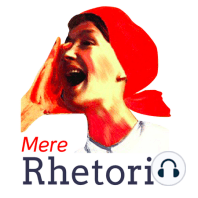7 min listen
Rhetorical Situation (NEW and IMPROVED!)
FromMere Rhetoric
ratings:
Length:
11 minutes
Released:
Oct 19, 2016
Format:
Podcast episode
Description
Shout out to Daniel T Richards to wrote in to me asking for a podcast about Rhetorical Situations. Couldn’t be more pleased to oblige a fan, if you have a request for an episode or a question or comment, feel free to email me at mererhetoricpodcast@gmail.com and I’d love to see what I can do, but Daniel asked for rhetorical situations and there’s no time but the present, eh? so let’s get it started with a couple of clips, eh? Churchill, Henry V, and Aragon. Why are these such great speeches so good? Qtd Churchill There comes a precious moment in all of our lives when we are tapped on the shoulder and offered the opportunity to do something very special that is unique to us and our abilities, what a tragedy it would be if we are not ready or willing.” This moment is part of what L B in 1968 calls the rhetorical situationation. More fully: A complex of persons, events, objects, and relations presenting an actual or potential exigence which can be completely or partially removed if discourse, introduced into the situation, can so constrain human decision or action as to bring about the significant modification of the exigence. OK, let’s break this very dense quote apart. First there is exigence, which is a problem that exists in the world. It may be pressing, like an upcoming battle, or it may be gnawing, like an increase in teen violence or campus discrimination. It may even be potential: Henry V didn’t have to go to France, but there was a potential there. The key thing for Bitzer is that this exigence can be affected by discourse. So you may not be able to talk the orcs away from being evil, but you can talk the men fighting them into being brave. A speech churchil makes to parlement won’t make the Nazis retreat, but it may shore up patriotic interest. So not every situation is a rhetorical situation, but only what Bitzer calls “finest hours” (3) when discourse can DO anything about it. As he says, a “mode-altering reality, not by the direct application of energy to objects, but by the creation of discourse which changes reality through the mediation of thought and action” (4). Reality-changing discourse. That’s a pretty awesome power for rhetoric to have. But that’s not to say that Henry V or Churchill or Aragon can say whatever they want. In addition to the moment, to exigence, the rhetorical situation relies on an audience. When the men of the west or of England are standing at the start of a battle and can fight half-heartedly or lion-heartedly, they are able to be mediators of change. It wouldn’t do much good for Aragon to be giving this speech to Frodo or Sam—for one thing they aren’t men—but for another they aren’t an army. The army can fight one way or another and that action can impact the way the battle goes. For Bitzer, the audience must be agents of change. Finally, there are constraints. These are kind of the downers of the rhetorical situation. Contraints include what Aristotle calls artistic and inartistic proofs—things you can change and things you can do nothing about. So Henry V can’t talk more English solders into suddenly appearing in his army, he can’t talk the French into being weaker, and he can’t talk swords into tennis balls, but he can change beliefs and attitudes about the slim chances of success. These three elements: the moment, the audience and constraints, all combine in a delicate balance for the rhetorical situations. Bitzer points out Rhetorical situations can be mature or decayed, dissipate audience, lose to completing forces, etc (12). The rhetorical situation is a helpful way to think about seizing your own “precious moment” and a good way to analyze historical and fictional bits of rhetoric. But there are plenty of questions So does the rhetorical situation just alight on one? Would anyone have made the same speech at Henry V, or Churchil or Aragorn in the same situations? Maybe. John Patton says that there’s a two-sidedness to the rhetorical situation. You have to see it and also resp
Released:
Oct 19, 2016
Format:
Podcast episode
Titles in the series (99)
Isocrates' Encomium of Helen: Shownotes (transcript available upon request) Complaint that Gorgias has not written a true encomium, but an apologia--a defense. He only defended her actions as not her fault instead of saying what she was actually excellent at. Isocrates complains... by Mere Rhetoric
